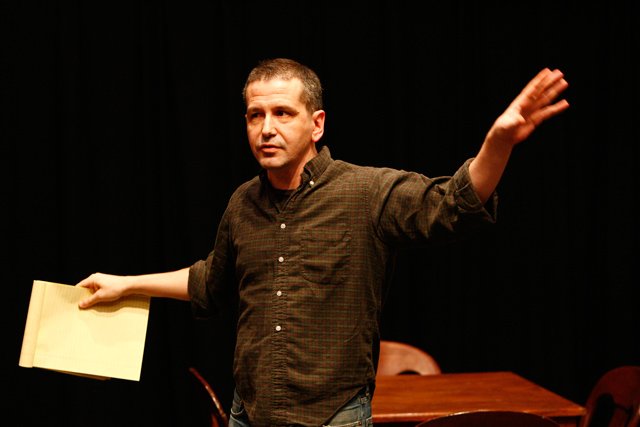Opinionist: <em>Our Town</em>
March 8, 2009, 5:10 p.m.
David Cromer as the Stage Manager. Photo by Carol Rosegg. Most

David Cromer as the Stage Manager. Photo by Carol Rosegg.
Most of us associate Our Town with unbearably earnest high school drama club productions, or reruns of that very special "Growing Pains" episode in which Mike and Boner get cast in the play and Mike decides he wants to be a professional actor while wearing a regrettable vest. But Chicago director David Cromer, who won an OBIE for last year's Adding Machine, has come to wrest Thornton Wilder's 1938 play back from the tween stage hogs. His inspired interpretation remains faithful to Wilder's intriguing blend of naturalism and formal deconstruction, while also eschewing the hokey, Norman Rockwell sentimentality that's de rigueur for amateur productions.
In addition to directing, Cromer also plays the Stage Manager, who breaks the fourth wall to introduce the early-twentieth century inhabitants of Grover's Corners, the fictional New Hampshire town at the center of the story. Wilder's instructions called for few props and no set, and Cromer's production unfolds accordingly, with just some tables and chairs. But the Barrow Street theater has been brilliantly reconfigured for the show, with the play performed in the 3/4 round. Since the house lights remain up throughout the performance, there's often little distinction between the audience and the actors, who are dressed as contemporary suburbanites in jeans and sweats, and speak without any old-timey affectation. There's an arresting immediacy to this approach, and the atmosphere of small-town America is evoked simply by trusting the actors' ability to engage the spectators' imaginations.
Cromer is delightfully dry and businesslike as the Stage Manager, describing the people and places of Grover's Corners without a drop of nostalgia. And his ensemble delivers nuanced and compelling performances; watching them, we feel we're observing ourselves muddle through life here in desperate 2009, not our distant ancestors—though unlike us, they're tuned into the change of seasons, not changes in Facebook status. From the first beat, the production is consistently humorous, then gradually mesmerizing, so that by the third act, when Cromer breaks from Wilder's minimalist instructions with a virtuoso burst of hyper-realism, the impact is revelatory. It's then that Wilder's premise, that life passes us by while we "move about in a cloud of ignorance," hits the chest with full force. Cromer has succeeded in reminding us why Our Town has been done to death: It's a near-masterpiece, and, in the right hands, deeply inspiring. His hands are right: Do not miss this.